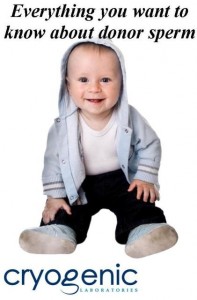The following background information on sperm banking was prepared by and agreed upon by the leading companies in the industry. Its purpose is to provide basic information about some of the key elements of a sperm bank’s operations and influence, and to further understanding by providing accurate and consistent information.
Donor Information: As part of the screening process to determine donor eligibility, sperm banks gather a great deal of family (3 generations) and personal medical history. In addition, while donating, donors are given physical examinations every six months, and are also tested for a wide array of infectious diseases at least every six months. Most sperm banks also perform chromosome analysis (karyotype) and test for many common genetic diseases such as cystic fibrosis in the general population, and genetic conditions common to certain ethnic groups (e.g., sickle cell trait for African Americans). Donors are interviewed extensively to check for consistency and accuracy of reported information. In addition to the screening and testing of donors used to establish medical eligibility to donate, sperm banks also offer other “soft” information on its donors such as childhood photos, personality tests, audio interviews, staff impressions, and personal profiles. It has been said that the amount of medical and personal information on an anonymous donor greatly exceeds the knowledge most people have of a known partner.
Donor Anonymity: The maintenance of donor anonymity is essential to the availability and quality of donors. There are those who believe that the identity of all donors should be known, and such disclosure is, in fact, required in a number of countries such as the United Kingdom and Australia. But the consequence of this requirement has been a severe shortage of donors, since most donors do not want to be known. However, the industry is sensitive to the desire by some for “known” donors as an alternative to anonymous donors. Consequently, now most of the major sperm banks offer donors who have agreed to have their identities disclosed to their offspring at age eighteen. Interestingly, known donors are not selected disproportionately more than anonymous donors. Since it is clear that many want their donors to remain anonymous, sperm banks do not think it is wise to destroy the anonymous status for ALL donors. To do so would breach the contracts and representations made to donors and to those who selected an anonymous donor, and eliminate for a large segment of potential users of sperm donors the much wanted option to select a forever anonymous donor. Read CLI’s Privacy Policy.



